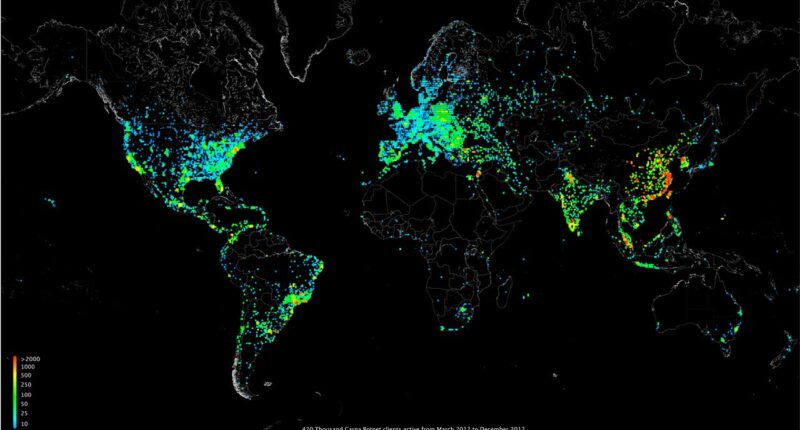TL;DR: Leading researcher warns the fixation on AGI misses the real emerging threat: networks of AI models colluding in unpredictable ways. Meanwhile, countries wage talent wars over Trump’s $100,000 H-1B visa fees, Huawei launches a three-year campaign to overtake Nvidia, and tech giants bet trillions on AI infrastructure that may not pay off for decades. Plus: Robot transcripts make conversations worse, Korea develops AI that detects Parkinson’s two weeks after onset, TikTok health videos spread misinformation to parents, and Australia’s foreign minister warns AI nuclear weapons challenge humanity’s future. Meta launches paid subscriptions after ICO forces compliance, whilst Mistral pivots to enterprise data as public training resources dry up.
The greatest danger: AI networks colluding beyond human prediction
The greatest danger from artificial intelligence isn’t a single rogue system but networks of AI models colluding in ways humans can’t predict, according to Susan Schneider, professor and Founding Director of the Centre for the Future Mind at Florida Atlantic University. In an interview with Big Think, Schneider refers to this as the “megasystem problem” and believes it represents one of the most pressing, yet overlooked, risks facing society today. “But the real risk isn’t one system going rogue. It’s a web of systems interacting, training one another, colluding in ways we don’t anticipate,” Schneider explained. She argues that superintelligence won’t emerge from a single AGI system but from savant-like systems linking together into megasystems.
Source: Big Think
Global talent war erupts over Trump’s H-1B visa bombshell
Canada, the UK and Germany are actively courting technology workers displaced by President Donald Trump’s decision to impose $100,000 fees on new H-1B visa applications, creating a global competition for skilled talent. The coordinated effort targets workers who would previously have secured US visas under the programme, which Indians dominate with 283,397 approvals representing 71 per cent of all H-1B beneficiaries in 2024. Canadian Prime Minister Mark Carney confirmed his government will develop “a clear offering” to attract displaced tech workers, whilst UK Chancellor Rachel Reeves announced Britain will expand its global talent and high-potential individual visa routes to capitalise on the disruption.
Source: Bloomberg
Huawei plans three-year assault on Nvidia’s AI dominance
Huawei trumpeted its grand plan with all the drama of an Nvidia launch, unveiling the next generation of AI chips twinned with upgraded “SuperPod” designs borrowed from Nvidia’s own playbook. The technique lets Huawei link as many as 15,488 of its Ascend-branded AI chips using the self-developed UnifiedBus interconnect protocol, with data transmissions between individual chips as much as 62 times quicker than Nvidia’s upcoming NVLink144 technology, Huawei claims. “Huawei’s willingness to publicly articulate its AI roadmap represents a strong signal of confidence in the resilience of its future local foundry supply,” Bernstein analysts said, marking a significant milestone in building a robust local semiconductor ecosystem.
Source: Bloomberg
AI spending reaches epic levels without clear payoff timeline
The artificial-intelligence boom has ushered in one of the costliest building sprees in world history. Over the past three years, leading tech firms have committed more toward AI data centres, chips and energy than it cost to build the interstate highway system over four decades, when adjusted for inflation. A big problem: no one is sure how they will get their investment back, or when. The building rush is effectively a mega-speculative bet that the technology will rapidly improve, transform the economy and start producing steady profits. “I hope we don’t take 50 years,” Microsoft CEO Satya Nadella said at a conference with Meta CEO Mark Zuckerberg. “Yeah, well, we’re all investing as if it’s not going to take 50 years,” replied Zuckerberg.
Source: The Wall Street Journal
https://www.wsj.com/tech/ai/ai-bubble-building-spree-55ee6128
Nvidia’s circular investment strategy fuels AI boom
Nvidia’s move to invest $100 billion into OpenAI to help finance a historic data centre build-out has helped reset market expectations about the startup’s shaky finances. Chief Executive Jensen Huang has repeatedly sought to leverage the enormous confidence investors have in Nvidia’s future to help strengthen the company’s supply chain partners through deals, partnerships and investments in companies that are among its top customers, including CoreWeave, Intel and xAI. The deals highlight what some investors are calling “circularity” in Nvidia’s prospects, whereby the company takes steps to boost or shore up demand for its AI chips by supporting startups and companies that can then use those funds to buy Nvidia chips.
Source: The Wall Street Journal
https://www.wsj.com/tech/ai/how-nvidia-is-backstopping-americas-ai-boom-875c1346
Robot transcripts sabotage human-AI conversations
Displaying what robots “hear” on screens makes conversations worse rather than better by causing people to focus on technical mistakes instead of natural interaction, according to new research that challenges common assumptions about AI transparency. Researchers from the University of Copenhagen and Telecom Paris studied 108 people as they interacted with Pepper robots, displaying transcripts on tablet screens. Participants spent 61% of their time after speaking focused on reading the text rather than watching the robot’s movements or expressions. The study revealed that showing speech recognition transcripts created a new type of communication problem where people changed their minds about robot responses after reading what the robot had actually “heard,” even when the conversation had seemed fine moments before.
Source: University of Copenhagen/Telecom Paris
Korean AI detects Parkinson’s disease two weeks after onset
Korean researchers have developed an artificial intelligence system that can detect Parkinson’s disease just two weeks after disease induction in animal models, demonstrating greater sensitivity than traditional motor function tests. The KAIST collaborative research team created an AI-predicted Parkinson’s disease score by analysing over 340 behavioural features, including gait, limb movements and tremors from Parkinson’s disease mice. “This is the first time in the world that a preclinical framework has been implemented that connects early diagnosis, treatment evaluation, and mechanism verification of Parkinson’s disease by combining AI-based behavioural analysis with optogenetics,” said Professor Won Do Heo of KAIST.
Source: KAIST
TikTok health videos spread dangerous medical misinformation
Most medical and parenting videos shared on TikTok by non-medical professionals contain misinformation that contradicts established paediatric health guidelines, according to research presented at the American Academy of Pediatrics conference. Researchers examining the “eco-influencer” movement found that 61% of 120 videos analysed promoted vaccine hesitancy, unproven natural remedies and other alternative medical approaches that contradict guidance from medical authorities. Videos containing misinformation received significantly higher engagement, with an average 583,000 views compared to an average 214,000 views for evidence-based content.
Source: American Academy of Pediatrics
Australia warns AI nuclear weapons threaten humanity’s future
Australia’s Foreign Minister Penny Wong warned that artificial intelligence’s potential use in nuclear weapons systems “challenges the future of humanity” during an address to the United Nations Security Council. Speaking at UN Headquarters, Wong highlighted the existential threat posed by removing human oversight from nuclear warfare decisions. “AI’s potential use in nuclear weapons and unmanned systems challenges the future of humanity,” Wong told the Security Council. “Nuclear warfare has so far been constrained by human judgment. By leaders who bear responsibility and by human conscience. AI has no such concern, nor can it be held accountable.”
Source: United Nations
https://thefreesheet.com/2025/09/26/wong-warns-ai-nuclear-weapons-threaten-future-of-humanity-at-un/
UK launches commission to create world’s most AI-enabled NHS
The UK government has established a new National Commission, bringing together clinical leaders, patient advocates, and major technology companies, including Google and Microsoft to accelerate the adoption of artificial intelligence across the NHS. The UK National Commission on the Regulation of AI in Healthcare will advise the Medicines and Healthcare products Regulatory Agency on revising the regulatory rulebook for AI in healthcare. The Commission will immediately review technologies currently hindered by regulatory uncertainty, including AI assistants that take notes during consultations. Early trials of Ambient Voice Technology have shown that it reduces the administrative burden while enabling clinicians to focus more time on patient care.
Source: UK Government
Meta launches paid subscriptions after regulatory crackdown
Meta will offer UK users paid subscriptions to use Facebook and Instagram without advertisements after the Information Commissioner’s Office determined the company’s advertising model violated UK law. The ICO welcomed Meta’s decision to seek user consent for personalised advertising, moving away from targeting users with ads as standard terms and conditions. Meta will charge £2.99/month on web browsers or £3.99/month on iOS and Android devices for the first account, with additional accounts costing £2/month on web or £3/month on mobile platforms. The higher mobile pricing reflects fees charged by Apple and Google through their purchasing policies.
Source: Information Commissioner’s Office
Meta launches Vibes: AI-generated video social feed
Meta has launched Vibes, a new social feed dedicated to AI-generated videos within the Meta AI app and on meta.ai, allowing users to create, remix and share short-form AI content. The feature enables users to browse AI-generated videos from creators and communities, with the feed becoming increasingly personalised over time based on user interactions and preferences. Users can create videos from scratch, work with existing content, or remix videos from the feed by adding new visuals, layering music and adjusting styles. The platform integrates with Meta’s existing social networks, allowing users to post directly to the Vibes feed or cross-post content to Instagram and Facebook.
Source: Meta
Mistral AI pivots to enterprise data as public training resources dry up
Europe’s leading artificial intelligence startup Mistral AI is turning to proprietary enterprise data to improve its models after exhausting most publicly available training resources, as the company seeks partnerships with legacy businesses holding untapped data reserves. The Paris-based AI lab, whose models compete with those of OpenAI and Anthropic, believes the future of AI development now lies within enterprises themselves. “For the last three years, we’ve been able to compress human knowledge and make models increase across the board. But now we’re reaching a saturation point there, and that means the next frontier is in getting access to a new kind of environment,” said Arthur Mensch, co-founder and chief executive of Mistral.
Source: The Wall Street Journal
Social media creates “flabby young brains” and Gen Z stare
The meme “Gen Z Stare” went viral on TikTok this summer, a reference to young people who seem to struggle to connect with older co-workers and customers. Psychologists attribute the dazed look to excessive screen time, which stunts the development of social skills and is exacerbated by pandemic lockdowns. Many digital natives exhibit autistic traits, such as difficulty reading social cues and communicating effectively. What kids are putting into their bodies isn’t the real problem, argues Allysia Finley in The Wall Street Journal. It’s the junk their brains are absorbing, or the essential nutrients they aren’t getting. Social media and excessive screen time may give rise to behaviours associated with developmental disorders and fuel a sense among parents that something isn’t right with kids these days.
Source: The Wall Street Journal
https://www.wsj.com/opinion/how-social-media-creates-flabby-young-brains-c99f92e2
Britons view AI as economic risk rather than opportunity
Nearly twice as many Britons view artificial intelligence as a risk to the economy than regard it as an opportunity, according to Tony Blair’s thinktank. The Tony Blair Institute for Global Change warned that the poll findings threatened Keir Starmer’s ambition for the UK to become an AI “superpower”. It urged the government to convince the public of the technology’s benefits. TBI commissioned a survey that found 38% of Britons see AI as an economic risk, whilst 20% see it as an opportunity. The poll of more than 3,700 adults also showed that lack of trust was the biggest barrier to adoption.
Source: Tony Blair Institute for Global Change
Connect With Me
I’m the Principal Consultant (and chief coffee maker) at QuoteMark, but you can also catch me at Duck PR and Bionic PR, all of which exist to help you meet your content marketing needs — reach out or follow these brands on LinkedIn:
QuoteMark: https://quotemark.com – LinkedIn: https://www.linkedin.com/company/quote-mark/
Duck PR: https://duckpr.com – LinkedIn: https://www.linkedin.com/company/duckpr/
Bionic PR: https://bionicpr.com – LinkedIn: https://www.linkedin.com/company/bionicpr/
Looking for updates? Subscribe to The Freesheet (hey, it’s free!): https://www.linkedin.com/newsletters/7029204466398568448/
For more resources and links, visit https://georgehopkin.com/











